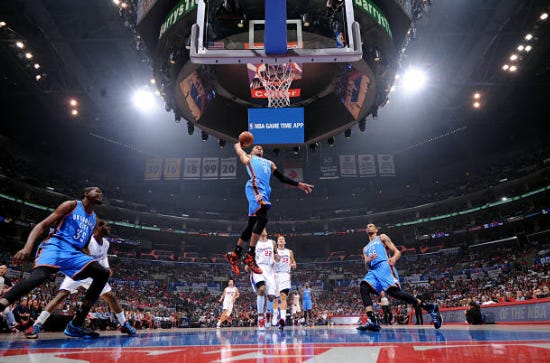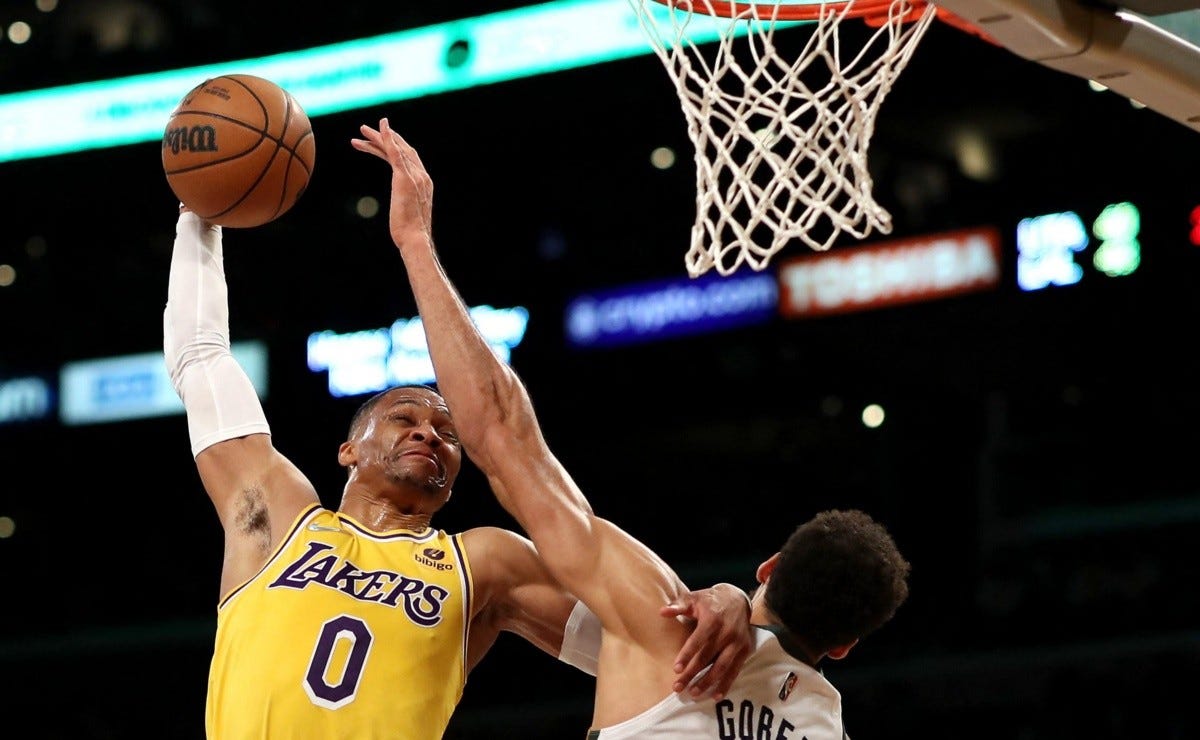To go with the farthest thing from grace
The heady, unselfconscious spectacle of Russell Westbrook.
It’s only five miles from Hawthorne, California to the Pacific ocean, but it’s so flat, comprised mostly of low stucco apartments in drab tones of sand, stout little bungalows and strip malls that stretch as far now as the open land must have seemed to the barely 50 settlers from New Spain in 1781, that there is no sense of variation, that the continent is about to come to an end.
Even when you creep west past Highway 1, the environment continues to invert. Bunched, stubby ficus trees on the medians replace the gangly tall palms from downtown. Only when you start to climb on El Segundo Blvd., the Chevron Refinery tanks laid out to the south beyond a man-made levee where eucalyptus and thick Bermuda grass are left alone in an attempt to blot out in bright green distraction the plumes of smoke and acres of post-apocalyptic piping, does it become clear from the mist forming into clouds coming up from the horizon that the land is changing, lifting. Follow along a little farther and the roads are forced to break up, split away into short side streets around the big dunes, still there under the asphalt. Houses gain storeys and strange angles, newer builds, architectural plans that could include promise, the hope for a view. Keep going and a road will crest and the eye will naturally travel to the farthest open point ahead it can see, blinking to accommodate the sudden open space and, on a clear day, all those gradients of blue in ocean and sky, reconciling.
It was flat like that before the airport got there. When Hawthorne was named by two early 20th century fanboys after New England author Nathaniel Hawthorne, when it was a sundown town, when the Beach Boys all grew up there, pining for the water that was still an hour away on foot.
When Russell Westbrook started high school he stood about 5’7”. Long Beach, the South Bay, Hawthorne, he navigated this wide, flat swath of California, a state thats better half is perpetually threatening to slide into the sea, from the perspective of average. Average height, average potential, average days in a microclimate with not much of a view.
He didn’t start playing basketball until he was a sophomore, didn’t get a recruitment letter from any college until his senior year and when he did it was UCLA, a 21 minute drive north up the 405 that at least flashed a view of the Santa Monica Mountains. Some height, finally, as Westbrook’s body strained to meet it, shooting up to 6’3” the summer before college.
Martin and I are talking about Meat Loaf, the music and the man — before he turned crazy in the way men past 50 seem to — but more the music. How dramatic it was. The breathy, near-minute intro monologue to ‘You Took The Words Right Out of My Mouth’, asking whether she’d show her throat to the wolf with the red roses on a hot summer night and her, ostensibly asking Meat Loaf, does she get its mouth? Its teeth? Its jaws? Its hunger? After every question he hisses yes. The song starts. No explanation for the intro, no need, dramatic without over-posturing about it. Dramatic that gets on with itself.
Prince was like that, in everything. His eyelash heavy smirks, that eye-roll of a lilt. How he sang every line on a jagged inhale, a simultaneous hand beckoning and a palm laid flat, pushing away — daring you, denying you. You can’t listen to a lot of his songs without feeling, for a second, like you are going to explode, but ‘Darling Nikki’ will for a breath turn you inside out. It makes my brain catch still, when I remember that he’s gone.
Bowie was almost an alien come to earth who never quite got it and knew he never quite got it but held you close with a wink about it, like it was just between you two. And Jarvis Cocker, his lyrics urgent, murmuring lists under his breath, the way you’d talk to someone if you were trailing them, ardent, surreptitiously tucked into a doorway or crammed in a bathroom stall together. Music that is so self-informed, self-centred, so unselfconscious that it’s collapsing into itself, sucking you whole into its universe.
I wish there was more like it. How strutting and cocky and sure I feel when I listen to those songs. How decadent they are, how funny and beautiful and wrenching in what seem the wrong places. The worst part always when they end, leaving you wound loose and frothed up with no place to go but back to real life.
When you watch Westbrook’s college tape you are struck by the weight of his steps, the sound his feet make on the hardwood, loud to the point where you wonder if the footage has been sound mixed. Crashing downhill, a locomotive going coast to coast, his feet heavy and sure, gravity’s favourite. His is not a natural verticality, when Westbrook gets up into the air it’s with a yearning still bolted to earth. Even then, on his bunched and easy 18-year-old legs, he didn’t hang around up there. His pop ups in the paint, the fly-by lobs and layups, the emphatic part is always the downbeat. Funny too, his closest teammate and the person now who sometimes seems to understand him best in the league, Kevin Love, grew up in the same low, endless pocket of Los Angeles, plays with the same tight wound and low centre.
You know who it was that gave Westbrook a view? Kevin Durant. In their first season together in Oklahoma City, KD cut Russ’s tethers.
It started with the alley-oops. Durant cruising down the wing, deceptively slow, his long strides eating up the floor and then a bolt of lightning, Westbrook heaving his body up across the court for the ball you hardly clocked leaving Durant’s hands. Westbrook seemed to realize how little interference he’d get up there, and with the same way he hoisted his shots from way past the arc with an urgency that eclipsed back into inertia, he sent his body out and up as if burst from a canon at half court.
He hit the rim with such velocity in those early days, hands gripping it so hard his arms and elbows torque in, invert, that there are times it seems impossible he didn’t take it with him rather than hang there, legs and torso flung up horizontal against the basket. It was like a necessarily coming apart, like a spaceship shedding the pieces it needed to get into orbit, Westbrook lost the emphatic weight of his feet, shook the familiar, sturdy comfort of ground.
That 2012 Thunder team lived for the chase, came from behind all season because between Westbrook, Durant, James Harden and Serge Ibaka, making up ground was a pleasure. But the Heat team they’d meet in the Finals flanked them. Miami with LeBron James and Chris Bosh and Dwyane Wade knew what to do with green velocity: put it in a vice and crush it slow enough that it could never come back on such ready legs. Harden left, Ibaka went not long after, and for a while it was Westbrook and Durant like the only two basketball players in the world, enforcing that world, game after game. The scope of them, shrinking.
High-water marks are inherently anomalies, they don’t exist to happen again. When OKC came apart it must have felt, to Westbrook, like he’d finally climbed up to see past where he’d come from only to have the world he’d made in getting there drop away. It’s why I don’t minimize how isolating, lonely and plainly like mourning it must have felt to see Durant go to the Warriors. If Westbrook made it seem personal, if he lashed out, that’s because it was. Somebody leaving you for the sinking pit in your stomach that you’ve suspected all along? It’s a trope for every person alive because every person alive has felt that feeling.
What’s happened with Westbrook, season over season since then, has been a diminishing and a simultaneous shoring up against the elements of a league hurtling forward, pressing in.
Westbrook came up in an NBA where being a good teammate, in the sense of adjusting yourself to fit, was secondary to the 2010s renaissance of super stardom. Superteams were constructed not on complimentary attributes of play, or gradually working toward the shape of a well-crafted whole, but as individualized atomic bombs of talent, skill, athleticism and ego meant to overwhelm. Westbrook is too smart not to see, home now from one long, full lap around the league, where he’s been left behind and how he’s lost the leverage to propel himself to catch up. He’s also too stubborn, too much himself, to change.
When Westbrook dunked on Rudy Gobert this week it was almost embarrassing, how laid bare he became, because of how much he meant it. From his knuckles going white on the rim where he held on, to the near complete erasure of Gobert even as Westbrook moved through his body, the taunting afterward, as he prowled up and down the baseline, that got him a tech. There’s that saying, act like you’ve been there before, but for Westbrook who has — many, many times — it was a screaming reminder to everyone watching. It was vintage Russ, brash, unconcerned, oblivious, headily over-the-top, so self-centred he collapsed the entire game for a moment, sent it into the black hole of Westbrook. To go with the farthest thing from grace.
Every season I wait for Westbrook to find the place where he can settle into a team that gets his ups and downs, the long frustrations, his and ours. But what if he’s like those artists, those songs? A breathless, rushing, tactile three to five minutes when he’s on the floor, punching for everything and not giving a shit what doesn’t land. Urgent and collapsing, understanding now better than ever how fleeting perfect scope and monumentality are, how little either might bring you.
It hardly matters how much you’ve heard them, those songs are always landing, so long as they’re playing.





As a Russ fan-turned-apologist who's also a Lakers fan (also, awesome description of SoCal!), this is fantasticnutshelling of the Russ Experience.